 |
| Download pdf file | Newsletter archives | |||
| Dieser Newsletter auf Deutsch | Cette newsletter en français | |||
 |
1. Clear demands for legislation |
 |
|
Issues with the EWC Directive summed up in a nutshell
The ETUC criticizes the fact that the number of European works councils has not significantly risen since the recast Directive of 2009. A mere one third of all companies, which fall under the scope of the Directive, benefit from a EWC. The position paper makes a new and clear reference to the digitalization of the economy, which in the ETUC's opinion, requires a stronger involvement of European works councils. The most important points of the position paper are as follows:
Full text of the position paper Dossier on the role of European works councils in restructuring Magazine article on the current EWC landscape
How will the employers' associations react?
While past resolutions of European trade unions were often filled with general policy demands, this paper sums up so well the issues that it must have set all the alarm bells ringing in employers' heads. Management's exclusive decisional power in multinational companies is being challenged. In Germany this is called "codetermination" and in Anglo-Saxon countries the "Stakeholder Economy". In the future it will no longer be acceptable to present strategic planning in a "song and dance act" before members of the European works council if it ends up with a threat of severe sanctions. For the employers' associations, a red-line will have been crossed if the ETUC demands are adopted by the legislator. The discussions will probably proceed similarly to those in France, in January 2014, when legal deadlines for the consultation procedure were introduced (see report in EWC News 1/2014).
Forthcoming event
Current developments in the legislative process will be covered in the EWC Academy conference, to be held on 29 and 30 January 2018, in Hamburg.
German Federal Government should develop codetermination
On 10 February 2017, the German Upper House of Parliament demanded that the gaps in German codetermination rights, which are a consequence of digitalization and globalization, be closed. The request was initiated by five federal states with red-green state governments. The first part of the request aims at adapting the term of "employee" to modern workplace reality. Since the number of "employee-like personnel" is constantly growing through digitalization and the network economy, they should have the same protection as normal employees.
The second part of the request refers to the avoidance of codetermination. The conversion into a European Company (SE) or another foreign legal form is used more and more often as a means of restricting influence of employee representatives on the supervisory board or to avoid codetermination completely. The Hans Böckler Foundation regularly releases figures on the subject and describes the increase as "dramatic" (see report in EWC News 1/2015). This trend should be stopped by new legislation.
Report on the request from five Federal States Full text of the resolution from the German Upper House of Parliament Demands of German Trade Union Confederation (DGB) |
 |
2. When will the Brexit hit European works councils? |
 |
|
United Kingdom to remain a full member of the EU for two years
Membership of the United Kingdom in the EU will automatically end on 29 March 2019. The withdrawal agreements can only be ratified in time by the remaining 27 EU Member States, if the negotiations are finalized prior to October 2018. The European Parliament is not only consulted on the contents of the agreements, but also has a full right of veto. The MEP’s are considered as much less compromising than the EU bureaucrats. The formal guidelines for the negotiations will be adopted on 29 April 2017 by the heads of state or government and on 22 May 2017 by the European Commission. First of all, the financial questions and the status of EU citizens in Great Britain are to be clarified. However, serious discussions can hardly be expected to take place before general elections in France and Germany. The EU is only prepared to discuss future trade relations after clarifying all issues concerning its exit. Theresa May had declared on 17 January 2017, not only their withdrawal from the EU but also from the single market. Otherwise immigration control and full sovereignty on legislation would not be possible.
What happens, if negotiations fail or last longer?
In order to avoid this, the British government may request Brussels to postpone EU withdrawal. It is more likely however that an agreement is concluded on a period of transition ("transitional deal"), enabling further negotiations to be carried out without time pressure. During this transition period the country is no longer a EU Member State, but must however abide by EU laws and contribute to EU's budget (such as for Norway). Experts estimate a period of ten years is necessary for transition, while the European Parliament is prepared to accept three years at the most, namely until March 2022.
Press report on the "cliff edge" Assessment of future negotiation scenarios Framework of a possible transitional arrangement
The hour of truth: sometime between 2022 and 2029
The United Kingdom scarcely has any choice but to continue importing goods from the EU. The motherland of the industrial revolution hardly has any of its own industrial production left. Instead it has developed a huge dependency on the financial sector, which nevertheless is leaving the country because of the Brexit. The crucial date will be the end of the "transitional deal": from that day on the country would no longer be part of the European single market. Switzerland experienced this day in December 2016 (see report in EWC News 4/2016). There are numerous hurdles on the road ahead: the next parliamentary elections will be held at the latest in 2020, Scotland will decide on its independence and every day will bring new events in the economy. Perhaps the EU will lose one member state but stands to gain four new ones, i.e. the four former nations of the United Kingdom.
For European works councils, SE works councils and Special Negotiating Bodies nothing will change until 29 March 2019. Subsequently, if it should come to a "transitional deal", again nothing will change during its duration, since the EU Directives will continue to apply. In any event, even if the transition period comes to an end between 2022 and 2029, the UK government wishes to keep EWC legislation in place. Current labour legislation is not to be affected by the Brexit.
Further information on our special Brexit website |
 |
3. Conservative government's social policies |
 |
|
How do Polish trade unions get on with the government?
Many observers in Western Europe criticize this Polish government in particular for its dismantling of democracy (constitutional court, media reform etc.), but rarely consider their social policies. Key points include the family allowance (500 zł per child per month, ca. 120 €), the lowering of income tax for low earners, lowering of the retirement age, construction of council housing, an increase of the minimum gross wage to 2.000 zł (ca. 475 €) since January 2017. All three trade union confederations cannot see any alternative to the social policy of the government since the opposition parties wish to revert to neoliberal policies. The catholic Solidarność is ideologically favorable, but wishes to maintain however its independence as a trade union. At present, the social-democratic, OPZZ and left liberal Forum, ZZ, have no political partners in the party landscape. All three trade unions have been participating in the Social Dialogue Council since October 2015 (see report in EWC News 4/2015).
The economic situation
Poland has one of the fastest growing economies in Europe and is the only EU Member State to have come through the financial market crisis without negative growth. Unemployment is running at only just 6%, the lowest rate in 25 years. Regarding purchasing power, in 2016 Poland reached 69% of the EU average and consequently for the first time has overtaken Hungary and Greece. However wages are still relatively low with an average of around 1,000 € per month. Foreign investments continue to rise and the Brexit could also create additional jobs. Two million out of the 38 million Polish live abroad, most of them (one third) in the United Kingdom.
Collective bargaining takes place mainly at company level, but now only covers 11% of all employees. Currently, 11% of the Polish workforce are still union members. The decrease in unionization can be contrasted to the development of 3,300 works councils that have been established as a consequence of a EU Directive (see report in EWC News 3/2009). Poland is strongly represented in European works councils: 57% all EWCs have Polish representatives. However paper manufacturer Arctic Paper is the only firm with a EWC under Polish jurisdiction (see report in EWC News 3/2016).
Analysis of the relationship between trade unions and government Report on wages and social security contributions in Poland Yearly review of industrial relations in Poland in 2016
Forthcoming event
A seminar on Polish industrial relations and the role of Polish representatives in the EWC is being organized from 18 to 20 October 2017 in Gdańsk.
On 15 February 2017, the umbrella organization of the Finnish employers' associations, EK, gave notice to terminate all national cross-industry collective bargaining agreements and that there would be no renegotiations. In the future, collective agreements are to be only concluded for individual industries or on a company level. EK's president declared on 13 March 2017, that wages were still 10-15% too high to be internationally competitive.
The 22 different collective agreements terminated cover fundamental issues which are regulated by the legislator in other countries, e.g. the rights of representatives in the workplace. They also include regulations for skills training and the payment of union fees directly from the payroll ("check-off"). As in all Scandinavian countries, the trade unions are strong: close to 70% of all employees in Finland are union members. Such agreements have been usual practice since 1940 when, for the first time, the employers' associations recognized trade unions as nation-wide collective bargaining partners.
Report on termination of the collective bargaining agreements
Pilot project on universal basic income, despite the climate of welfare cutbacks
In Finland, the conservative coalition cooperating with a right-populist party has been in government since May 2015, and wishes to tackle the high unemployment (9%) with tough cutbacks in welfare. In September 2015, the trade unions called for a general strike (see report in EWC News 3/2015). In June 2016 however, they decided to sign up to the government's "Competitiveness Pact". Its main points are: Employees work three days more per year – with the same pay. Wages are frozen for a period of one year, employee's social security contributions are slightly increased and those of the employer lowered. A pilot project with 2,000 selected long-term unemployed people started in January 2017. They receive an unconditional universal basic income of 560 € monthly for a period of two years.
Report on Competitiveness Pact Analysis of the Competitiveness Pact from an employee viewpoint Report on the universal basic income pilot project Detailed report on the pilot project |
 |
4. Critical moments for works councils |
 |
|
Further and further away from a European works council
Statement from EWC chairman at the time
The legal deadline for concluding a true EWC agreement under British jurisdiction for Hewlett-Packard expired in February 2017. However the negotiations could not be completed successfully in time, due to the group splitting-up in the meantime. The hardware, data-centers and the services sector with 250,000 employees world-wide were spun-off into the new company Hewlett Packard Enterprise (HPE), in November 2015. The remaining PC and printer divisions have been operating as HP Inc. with only 50,000 employees world-wide and predominantly in sales and services in Europe. At the same time there was a substantial reduction in the workforce. The SNB chairman from the Netherlands left the company and numerous representatives who were transferred to the new company HPE, automatically lost their mandate in the SNB as a consequence.
A request could have been made for the establishment of a European works council in HPE, with a new deadline of three years beginning from zero. But one event was quickly followed by another. In May 2016, the group's management announced that the recently founded HPE was once again to be split-up to keep only its server business. The IT services sector was to be transferred to the US company, Computer Sciences Corporation (CSC), hereby creating one of the world's largest IT services companies. CSC has had a European works council under German jurisdiction, since 2000. A part of HPE employees were transferred to Datagroup, which has been operating as a European Company (SE) since November 2016 (see report in EWC News 4/2016). Another part of the staff was outsourced to the US workforce solutions provider Manpower, where there had been a legal dispute in 2014 concerning the establishment of a European works council (see report in EWC News 2/2014).
European works councils are to emigrate to Ireland
In anticipation of the Brexit, both HP Inc. and Hewlett Packard Enterprise (HPE) have declared that they no longer wish to establish their European works councils under British jurisdiction. In fact both are to be relocated to Ireland.
French-German cooperation necessary in the EWC
The French car manufacturer PSA (Peugeot Citroën) wants to acquire the European sites of General Motor's Opel and Vauxhall brands. This was announced on 14 February 2017. The PSA group's management already held a meeting with the European works council of General Motors on 20 February 2017 to discuss the possible consequences on employment. Opel has promised its employees that there will be no layoffs before the end of 2018. For some plants there is a guarantee until 2020.
The works councils however do not want to rely on PSA's verbal commitments. The chairman of the European works council demanded written "legally-binding" guarantees on 24 March 2017 and indirectly threatened strike action. The job guarantees should be integrated within the sales agreement. Experts estimate that around 6,000 jobs will be lost as a consequence of the merger. General Motors Europe has not made any profit since 1999. The French government holds a 12.7% stake in PSA and has already spoken out against any job slashes at Opel. The two companies have already been cooperating together since 2012 (see report in EWC News 1/2012). Following the merger, PSA will become the second largest car manufacturer in Europe after Volkswagen.
Press report on works council demands
Brexit threatens English sites
Vauxhall has 4,500 employees in two English plants whose future is being jeopardized by the Brexit. At the beginning of 2018, the group's management has to make the decision where the new Astra will be built in the future. There are fears that the Ellesmere Port plant near Liverpool could lose its production.
Report on the situation at Vauxhalls Report on the political discussions in England
Merger of the two European works councils?
Both companies have European works councils in place since 1996 on a "voluntary" basis and that of General Motors Europe operates under German jurisdiction. The group's CEO chairs PSA's EWC according to French custom. When the merger is finalized at the end of 2017, both bodies will have to merge. Article 13 of the EU Directive provides for the establishment of a Special Negotiating Body. Both European works councils may continue to operate in parallel to each other for up to three years. It is even possible for both to continue indefinitely on a voluntary basis.
The French car manufacturer Renault undertook a comprehensive revision of its EWC agreement in March 2016 to fully comply with EU legislation. To make it legally water-tight and to terminate the "voluntary" status of the agreement, a Special Negotiating Body was established (see report in EWC News 2/2016). There had been legal proceedings against PSA in the context of the consultation procedure leading up to the closure of a plant in Aulnay near Paris. A court in Paris confirmed the works council's request for interim injunction in January 2013 (see report in EWC News 1/2013). The automobile supplier Faurecia also belongs to the PSA group, and has its own EWC under French jurisdiction since 2003. |
 |
5. Current legal proceedings |
 |
|
US Company must disclose information on stock options
In June 2016, the European works council of Mayr-Melnhof filed a complaint following the violation of its information and consultation rights. The cardboard manufacturer's central management has been under criticism for years for not correctly involving its employee representatives (see report in EWC News 3/2016). It is the very first legal proceedings on the subject in Austria. It also remains the only EWC legal dispute currently underway in the whole of Europe. Similar procedures in two other companies were able to be settled out of court in 2016 (see report in EWC News 2/2016).
On 1 February 2017, the conciliation hearing before the labour and social courts in Vienna did not reach any agreement. The mediation plan proposed by the court was not accepted. Instead, a round of talks between central management and the EWC was held on 15 March 2017, to explore the contentious issues. Since there was likewise no solution found here, the first instance court is due to announce its verdict, on 19 May 2017. This legal case could end up at the European Court of Justice. Since in all previous cases, an out-of-court settlement has been reached beforehand, the 1,121 European works councils are still waiting for the first ever landmark decision from Luxembourg. Legal disputes concerning EWC law previously reached a peak in 2012, when court cases were running in five countries at the same time (see report in EWC News 4/2012).
Forthcoming event
Participants to our legal workshop held from 24 to 27 October 2017 in Berlin will be given on overview of previously case law.
Trade unions take SAP to court
As opposed to a German public limited company, the composition of the supervisory board in a SE is not defined by law, but is based on the SE participation agreement. There was an unsuccessful conciliation hearing before the labour courts in Mannheim at the end of January 2017. There was also a legal dispute concerning the size of the supervisory board for Zalando, the online fashion retailer. The labour courts in Berlin ruled in first instance, in June 2016 (see report in EWC News 3/2016).
Present members of the supervisory board |
 |
6. Newly established European works councils |
 |
|
Furniture manufacturer now to have two European works councils
Inter IKEA's annual plenary meeting is chaired by the employer, and a second meeting without the employer is held every year. Each EWC member has an annual allowance of ten days’ time off work in addition to time for meetings. The day-to-day administration is carried out by a select committee composed of five members, each benefiting from an annual 36 days’ time off work. The select committee chairman has an average two days’ time off per week for EWC duties. Poland is the largest country in the EWC where IKEA has its main manufacturing plants.
French chain store establishes EWC
The 18 members are from France (nine seats), Belgium, Spain, Portugal and the Netherlands. Switzerland and Monaco have one mandate each with observer status. The annual plenary meetings held in Paris are chaired by the employer. A maximum of two of the five-member steering committee come from France. All EWC members have a right to 60 hours’ time off work per year, the steering committee members 120 and the general secretary 180 hours. These do not include the time for meetings. There are an additional twenty hours for each individual restructuring project. An annual budget of 20,000 € is provided for day-to-day counselling and an ad-hoc supplement has been defined for any restructuring projects. The EWC receives two days training per term of office on economics as well as language courses. The budget for equipment and internal translations is 8,000 € per year. |
 |
7. Updated EWC agreements |
 |
|
Italian cement manufacturer renews EWC agreement
The EWC agreement for Buzzi Unicem was renewed on 29 November 2016 at their headquarters in Casale Monferrato, the "cement capital" of the Piedmont. The European works council has been in place since 2008, following acquisition of the German Dyckerhoff group where there had already been a EWC back in 1996 under German jurisdiction. The current EWC agreement of Buzzi Unicem was the first to be concluded on the basis of the new Italian EWC legislation in 2012 (see report in EWC News 4/2012). Since it had a limited duration, it had to be extended.
In the future the EWC is made up of 15 members, including six from Italy and four from Germany. It represents 4,700 employees in the EU, the largest country being Germany with ca. 1,800. In addition there is the Netherlands, Luxembourg, Poland, Czechia and Slovakia. It holds one annual meeting as well as in exceptional circumstances. The steering committee is made up of three representatives from Italy and two from Germany, who meet twice a year. Trade union officers from the three Italian Confederations and a coordinator appointed by the European Building Federation in Brussels are permanent guests. The EWC may in addition contract an advisor, whose fees are to be paid by the company. Two days training is provided each year.
Sheet flooring manufacturer improves EWC agreement
The European Forum of Tarkett signed a new agreement on 1 December 2016 in Paris. The Forum was already established back in 1996 under German jurisdiction. Today the company headquarters are situated in the Paris business suburb, La Défense, as a consequence of a wave of mergers. The Forum is chaired by an elected representative which is unusual in France. Tarkett has 12,500 employees in 100 countries around the globe and 34 manufacturing plants.
The European Forum has 18 members from eight countries. They meet once per year, alternately in the Paris head office and in one of the subsidiaries. All eight countries are represented with one seat each on the board. They meet three times per year with central management. The European Forum as a whole has a right to two days training per year, whereas each representative may benefit from an additional three days training per term of office individually. The text is clearly and concisely formulated and avoids strict regulations, such as usually found in French EWC agreements.
Updated agreement in French Construction group
The EWC has 22 members from nine countries, including nine from France and three each from Germany and Belgium. For the first time the agreement has been extended to also cover Switzerland. The steering committee is made up of a secretary, a treasurer and three additional members, appointed from at least four countries. For trial purposes, the quarterly meetings are being held via video conference. Plenary meetings are held twice per year under the chairmanship of the employer. Extraordinary meetings are provided in exceptional circumstances, following a request from two thirds of EWC members.
As usual in France, the time-off has been precisely defined. Each representative is attributed five days per year and the steering committee members an additional ten on top of the time for meetings. The annual EWC budget amounts to 60,000 € for its normal activities and 30,000 € for training, plus the costs for the regular consultation fees of a chartered accountant. A two-day training is organized every year in conjunction with a plenary meeting, to which substitutes are also invited. Since the group is permanently undergoing changes in structure, the agreement contains an appendix with sample data sheets, listing the information to be communicated to the EWC in the case of acquisitions or sales. |
 |
8. New SE conversions |
 |
|
Brexit drives major bank to Frankfurt and into the SE legal form
Employees occupy two of the six seats on the supervisory board. With 780 employees in Germany the ruling for one-third participation was applicable. The supervisory board is however soon to be extended to nine seats, including three employee representatives. One seat is attributed to Germany, another to Italy and in the future, the third to Luxembourg. The SE works council starts up with twelve members, including four from Germany. The steering committee has five members and will be extended to eight, should the SE works council grow in size, e.g. through the Brexit relocations. There are provisions for two plenary meetings per year with central management.
Problematic provisions in the SE agreement
The consultation procedure has very tight deadlines. The SE works council has only 14 days to render an opinion. Should central management not take their opinion into consideration, the second round of consultation which is typical in SE law, must be requested within seven days. A further extraordinary meeting is held within 14 days with a view to reaching an agreement. If no agreement is reached, the consultation procedure is terminated 14 days later, at the latest. In particularly urgent cases there are provisions for a "Fast Track Procedure" with shortened deadlines and via video conference.
The SE works council is explicitly refused the right to take to court any violation of their participation rights, to obtain an injunction. A similar formulation can also be found in the SE agreement of Zalando, the online fashion retailer (see report in EWC News 2/2014) and most probably, is in violation of the SE Directive. There is no legal possibility of overruling this formulation since the agreement contains an "eternity clause". If it is terminated and should renegotiations fail, its provisions continue to apply unchanged. Employee representatives can never revert to the SE Directive's standard rules. In the case of a future conflict, it will be impossible to follow for example the course taken by HSBC, the major British bank (see report in EWC News 1/2014).
The parent company in Zurich has had a European works council ("European Employee Forum") in place since 2002 under British jurisdiction which continues to operate in parallel to the new SE works council. Apart from Switzerland, there are representatives from other non-EU countries such as Russia, Turkey and Monaco.
Press report on the new company
Pump manufacturer does not want employee representatives on the supervisory board
The SE participation agreement was signed on 10 August 2016, and represents one of the shortest ever concluded in the history of this company legal form. The text merely refers to the standard rules of the German SE legislation. The new SE works council has 22 members, including six from Germany, and represents 1,230 employees in 16 countries, mostly with only small sales offices. The Brexit article is interesting: Countries which were EU members on 1 June 2016, will continue to have a permanent representation in the SE works council.
Meal Delivery company establishes European Forum
A SE participation agreement for HelloFresh was signed on 7 November 2016. The company from Berlin has been operating as a SE since 14 December 2016. HelloFresh is the world's largest delivery service for food with a subscription of prepared recipes in their "food boxes". This Startup, which was founded in 2011, has 800 employees in nine countries and is rapidly growing. The capital comes from the same financial investors who also founded the on-line fashion retailer Zalando.
The Special Negotiating Body had twelve members, including eight from the Netherlands, three from Germany and one from the United Kingdom. The new SE works council which is called the European Forum, has only one member per country and currently a total of three. They meet once annually and are directly elected by the workforce of their country. A steering committee is only put in place if the European Forum has more than five members. There is no employee representation on the supervisory board. The SE legal form is highly appreciated in the Startup-mail order industry such as in windeln.de the most recent example of a SE conversion (see report in EWC News 3/2016).
Background report on the SE legal form Recent data sheet from the Hans Böckler Foundation |
 |
9. The view beyond Europe |
 |
|
Norwegian construction group renews framework agreement
Belgian chemicals group with outstanding regulations
A social program ("Solvay Cares") which was concluded by the world works council on 22 February 2017 providing improved maternity leave and complementary healthcare, was launched on 1 April 2017. The family-owned business also provides a profit-sharing scheme for its 31,000 employees in 53 countries (see report in EWC News 2/2016).
Report on the signing of the framework agreement Full text of the framework agreement Report on the global social program
French automobile group strengthens world works council
Apart from core labour standards, this very extensive and comprehensive agreement also includes the basic principles of social dialogue, skills and self-development, issues of occupational health and security, equal treatment and the digital transformation. These principles explicitly apply also to suppliers, subcontractors, industrial partners and to the sales network. Besides the world works council, which will monitor compliance to the agreement, there are two other bodies in Europe: the European works council since 1996 and since 2008, a joint strategy committee where company management meets once annually for confidential early-stage discussions with the trade unions of the most important countries (see report in EWC News 3/2008).
Full text of the framework agreement |
 |
10. Interesting websites |
 |
 |
11. New publications |
 |
|
Since the crisis of the European monetary system the institutions of the EU have been directly exerting influence on the development of wages and collective bargaining systems in a hitherto unknown manner. This volume published in November 2016, examines the extent and the impact of this so-called "Economic Governance" interventionism in various regions of Europe. It originates from the results of a research project which was carried out by trade union institutes from 13 countries with financial backing from the European Commission. The authors' conclusion is that Europe needs a coordinated wage policy which guarantees appropriate minimum wages everywhere and strengthens the collective bargaining systems.
Further information with extract
In November 2016, the European Federation of Building and Woodworkers (EFBWW) published EWC guidelines which were developed during a two-year project financially backed by the European Commission. The manual contains important background information on how consultation procedures in European works councils should be organized. It also includes an analysis of EWC practice in 23 companies within the construction and woodworking industries, based on questionnaires and interviews with EWC members. A case study on the Lafarge-Holcim merger demonstrates the role of the two European works councils (see report in EWC News 3/2014). The appendix contains information sheets on different topics, including the transnational competence of the EWC, mergers and acquisitions and on the coordination between national and European level employee representations.
This manual which highlights the various aspects of European works council activities in three chapters was published in December 2016. First of all, the legal framework is covered with references to key issues in negotiating EWC agreements, including the definition of the transnational competence of the EWC, the coordination between national and European works councils and the issue of confidentiality. The second chapter makes a comparison of industrial relations between the individual European countries and the third contains exercises for improving internal co-operation in the EWC. The manual was developed by a French consulting firm during a two-year project sponsored by the European Commission.
Corporate responsibility in the supply chain
Download of Bangladesh Accord study Report on adoption of OECD Directive Full text of the new OECD Directive |
 |
12. The EWC Academy: Examples of our work |
 |
|
Conference with 53 participants from ten countries
The tenth Hamburg conference is to be held on 29 and 30 January 2018, once again in the Harbour Hotel Hamburg overlooking the river Elbe and the city skyline.
Steering committee wants to improve EWC working practice
The application of the new EU Directive to older EWC agreements is one of the topics of our EWC legal workshops, which we organize once every year. Next date: 24 to 27 October 2017 in Berlin.
Two European works councils to merge
So far there is a European works council in both companies. In TRW Automotive it was established in 1997 under British jurisdiction (see report in EWC News 3/2016). The merger of the two bodies will be based on the EWC agreement of ZF Friedrichshafen, which was concluded in 2000 under German jurisdiction. It is to be updated in the course of the merger, which was already planned in 2013 (see report in EWC News 1/2013). The establishment of a Special Negotiating Body according to article 13 of the EU Directives has not been planned. |
 |
13. Current seminar schedule |
 |
|
The EWC Academy and its forerunner organization have been holding conferences and seminars for the members of European works councils, SE works councils and Special Negotiating Bodies since January 2009. So far 726 employee representatives from 260 companies have taken part including many of them for several times. This represents around 21% of all transnational works council bodies in Europe. In addition there are numerous in-house events and guest lectures given to other organizations.
Overview of the forthcoming seminar dates
EWC seminar in Montabaur Castle (also suitable for SE works councils)
Report on this seminar in April 2012
Language courses: Business English for work councils
Further information on our language courses
Detailed program on request.
US conference for works council members
China seminar for works council members
Shared service centers in Central and Eastern Europe
In-house events
Topics for specialized lectures |
 |
14. Imprint |
 |
|
EWC-News is published by:
|
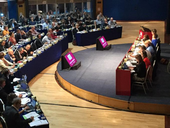 The executive committee of the European Trade Union Confederation (ETUC) met on 15 and 16 March 2017 in Valletta, the capital of Malta. It is the organization's highest organ which meets between congresses held every four years and makes fundamental policy decisions. Malta currently holds presidency of the EU Council. The delegates discussed the European works council Directive and adopted a position paper. The revision of the Directive has been overdue since June 2016, although the European Commission had begun preparations in April 2015 (see
The executive committee of the European Trade Union Confederation (ETUC) met on 15 and 16 March 2017 in Valletta, the capital of Malta. It is the organization's highest organ which meets between congresses held every four years and makes fundamental policy decisions. Malta currently holds presidency of the EU Council. The delegates discussed the European works council Directive and adopted a position paper. The revision of the Directive has been overdue since June 2016, although the European Commission had begun preparations in April 2015 (see 

 On 29 March 2017, the British Prime Minister, Theresa May officially requested the withdrawal from the EU. There had previously been a legal dispute at to whether or not this was possible without the consent of Parliament. At the same time Scotland demanded a second referendum on its independence. Northern Ireland and Wales are also holding discussions as to whether they should remain in the United Kingdom. For England there are suggestions for establishing regional councils.
On 29 March 2017, the British Prime Minister, Theresa May officially requested the withdrawal from the EU. There had previously been a legal dispute at to whether or not this was possible without the consent of Parliament. At the same time Scotland demanded a second referendum on its independence. Northern Ireland and Wales are also holding discussions as to whether they should remain in the United Kingdom. For England there are suggestions for establishing regional councils. If no agreement has been ratified on 29 March 2019, e.g. because one of the Parliaments involved has rejected the agreement, the United Kingdom would fall off a "cliff edge". EU and single market regulations would completely disappear overnight. On 22 March 2017, the EU's chief Brexit negotiator Michel Barnier, evoked the possible negative consequences: serious disruption of air traffic and long queues of trucks at the channel port of Dover, disruption of supply chains including even the suspension of the delivery of nuclear material to the island.
If no agreement has been ratified on 29 March 2019, e.g. because one of the Parliaments involved has rejected the agreement, the United Kingdom would fall off a "cliff edge". EU and single market regulations would completely disappear overnight. On 22 March 2017, the EU's chief Brexit negotiator Michel Barnier, evoked the possible negative consequences: serious disruption of air traffic and long queues of trucks at the channel port of Dover, disruption of supply chains including even the suspension of the delivery of nuclear material to the island. In September 2013, more than 100,000 people held demonstrations against the liberal-conservative government (photo), led at the time, by the prime minister, Donald Tusk. It was jointly organized by the three major trade union confederations. In their opinion the government of the time was favoring "the rich and powerful", employers and "foreign capital" and almost never paid any attention to the interests of "ordinary people". This is one of the reasons why the national conservative party PiS, has now been the governing since November 2015.
In September 2013, more than 100,000 people held demonstrations against the liberal-conservative government (photo), led at the time, by the prime minister, Donald Tusk. It was jointly organized by the three major trade union confederations. In their opinion the government of the time was favoring "the rich and powerful", employers and "foreign capital" and almost never paid any attention to the interests of "ordinary people". This is one of the reasons why the national conservative party PiS, has now been the governing since November 2015. All national framework agreements terminated in Finland
All national framework agreements terminated in Finland For the US group Hewlett-Packard there has no longer been a European works council in place since January 2014. The EWC, which was established in 1996, terminated its "voluntary" agreement and started legal proceedings against the company before the labour courts in Brussels. The dispute was triggered by unsatisfactory consultation on forthcoming mass redundancies as well as the regular obstructions to its means for functioning (see
For the US group Hewlett-Packard there has no longer been a European works council in place since January 2014. The EWC, which was established in 1996, terminated its "voluntary" agreement and started legal proceedings against the company before the labour courts in Brussels. The dispute was triggered by unsatisfactory consultation on forthcoming mass redundancies as well as the regular obstructions to its means for functioning (see 
 On 17 January 2017, the state labour court of Baden-Württemberg ruled on a complaint filed by the works council of Dow Chemical at their Rheinmünster site near Karlsruhe. Management had refused to provide information on the granting of stock options, which the US management distributes entirely at its own discretion. While the judges ruled that the works council does not have any codetermination rights on such incentive schemes, the group's German subsidiary however, should communicate, to which employees and to what extent stock options are granted. It is only by these means, that the works council can fulfill its legal role and ensure equal treatment of employees.
On 17 January 2017, the state labour court of Baden-Württemberg ruled on a complaint filed by the works council of Dow Chemical at their Rheinmünster site near Karlsruhe. Management had refused to provide information on the granting of stock options, which the US management distributes entirely at its own discretion. While the judges ruled that the works council does not have any codetermination rights on such incentive schemes, the group's German subsidiary however, should communicate, to which employees and to what extent stock options are granted. It is only by these means, that the works council can fulfill its legal role and ensure equal treatment of employees. Legal proceedings in Vienna still in the balance
Legal proceedings in Vienna still in the balance Through legal action, the IG Metall and ver.di trade unions want to prevent SAP from reducing the size of its supervisory board starting from 2019. In March 2014, as part of the process of converting the software firm into a European Company (SE), a SE participation agreement was concluded with provisions for a full-parity supervisory board of 18 members (see
Through legal action, the IG Metall and ver.di trade unions want to prevent SAP from reducing the size of its supervisory board starting from 2019. In March 2014, as part of the process of converting the software firm into a European Company (SE), a SE participation agreement was concluded with provisions for a full-parity supervisory board of 18 members (see  The manufacturing and logistics of the IKEA Group were spun-off into the Inter IKEA company in September 2016. The 26,000 employees involved are now to get their own EWC. The agreement was signed on 29 November 2016 in Delft (the Netherlands). To a large extent it is tailored on the text of the IKEA Group agreement, where there has already been a EWC in place since 1999. This represents 132,000 employees from the sales branches, from customer service and call centers. For tax purposes, IKEA has its company headquarters in the Netherlands (see
The manufacturing and logistics of the IKEA Group were spun-off into the Inter IKEA company in September 2016. The 26,000 employees involved are now to get their own EWC. The agreement was signed on 29 November 2016 in Delft (the Netherlands). To a large extent it is tailored on the text of the IKEA Group agreement, where there has already been a EWC in place since 1999. This represents 132,000 employees from the sales branches, from customer service and call centers. For tax purposes, IKEA has its company headquarters in the Netherlands (see 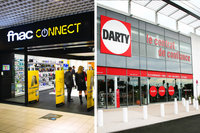 A EWC agreement was concluded on 6 December 2016 at the headquarters of the Fnac chain stores in the Paris suburb, Ivry. Fnac has 26,000 employees in Europe, with 19,000 alone in France, and sells books, media and consumer electronics. Until 2013 it was a subsidiary of PPR, the luxury goods holding and participated in its EWC (see
A EWC agreement was concluded on 6 December 2016 at the headquarters of the Fnac chain stores in the Paris suburb, Ivry. Fnac has 26,000 employees in Europe, with 19,000 alone in France, and sells books, media and consumer electronics. Until 2013 it was a subsidiary of PPR, the luxury goods holding and participated in its EWC (see 
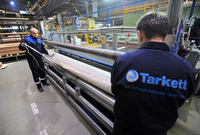
 A revised EWC agreement for Eiffage was signed on 30 December 2016 at their company headquarters in the Paris suburb, Vélizy-Villacoublay. The European works council was established in 1998 and falls fully under the scope of EWC legislation. A major part of the 65,000 employees world-wide are attributed to France, where there is a strong pro-union tradition in the workforce. The employees own 24% of the share capital.
A revised EWC agreement for Eiffage was signed on 30 December 2016 at their company headquarters in the Paris suburb, Vélizy-Villacoublay. The European works council was established in 1998 and falls fully under the scope of EWC legislation. A major part of the 65,000 employees world-wide are attributed to France, where there is a strong pro-union tradition in the workforce. The employees own 24% of the share capital.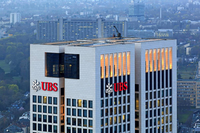 Since 1 December 2016, the Swiss bank, UBS, has been running its wealth-management operations for Continental Europe out of Frankfurt and has to this end founded the new UBS Europe SE company. It has 2,000 employees in nine countries. Frankfurt has therefore become the favored solution for the possible relocation of 1,500 UBS jobs from London, should Great Britain not only part from the EU, but also from the single European market. The SE participation agreement signed on 11 August 2016 has already made appropriate provisions for this.
Since 1 December 2016, the Swiss bank, UBS, has been running its wealth-management operations for Continental Europe out of Frankfurt and has to this end founded the new UBS Europe SE company. It has 2,000 employees in nine countries. Frankfurt has therefore become the favored solution for the possible relocation of 1,500 UBS jobs from London, should Great Britain not only part from the EU, but also from the single European market. The SE participation agreement signed on 11 August 2016 has already made appropriate provisions for this. The Busch group of companies based in Maulburg (Black Forest) was converted into a SE on 24 October 2016. The family business employs 2,600 employees world-wide, who are now completely denied any participation rights on the supervisory board. Busch has the world's largest product range of industrial vacuum pumps and is currently trying to acquire its competitor, Pfeiffer Vacuum from Hessen. If the acquisition succeeds, the new SE would also permanently prevent Pfeiffer Vacuum employees from participating on the supervisory board.
The Busch group of companies based in Maulburg (Black Forest) was converted into a SE on 24 October 2016. The family business employs 2,600 employees world-wide, who are now completely denied any participation rights on the supervisory board. Busch has the world's largest product range of industrial vacuum pumps and is currently trying to acquire its competitor, Pfeiffer Vacuum from Hessen. If the acquisition succeeds, the new SE would also permanently prevent Pfeiffer Vacuum employees from participating on the supervisory board.
 On 24 January 2017, the central management of Veidekke signed an international framework agreement with the Building and Wood Workers' International (BWI) for its 7,000 employees around the globe. Norway's largest construction group had already concluded such an agreement for the first time in 2005. From now on the entire supply chain will be covered, including suppliers, subcontractors and companies involved in joint projects. Local employee representatives are to monitor compliance to the agreement, and are given appropriate training and time off work. Compliance and practical experience of the agreement are examined once per year in a meeting in Oslo.
On 24 January 2017, the central management of Veidekke signed an international framework agreement with the Building and Wood Workers' International (BWI) for its 7,000 employees around the globe. Norway's largest construction group had already concluded such an agreement for the first time in 2005. From now on the entire supply chain will be covered, including suppliers, subcontractors and companies involved in joint projects. Local employee representatives are to monitor compliance to the agreement, and are given appropriate training and time off work. Compliance and practical experience of the agreement are examined once per year in a meeting in Oslo. On 3 February 2017 in Brussels, Solvay's central management and the global industrial union federation, IndustriALL, agreed to extend the global framework agreement on corporate social responsibility from 2013 (see
On 3 February 2017 in Brussels, Solvay's central management and the global industrial union federation, IndustriALL, agreed to extend the global framework agreement on corporate social responsibility from 2013 (see 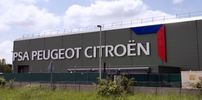 Central management of PSA and the Global Industrial Union Federation, IndustriALL, signed a framework agreement which is applicable worldwide, on 7 March 2017 at the headquarters of the International Labour Organization (ILO) in Geneva. It builds on the first agreement from 2006 and integrates the world works council established in 2010 (see
Central management of PSA and the Global Industrial Union Federation, IndustriALL, signed a framework agreement which is applicable worldwide, on 7 March 2017 at the headquarters of the International Labour Organization (ILO) in Geneva. It builds on the first agreement from 2006 and integrates the world works council established in 2010 (see  The independent trade union FABI boasts 100,000 members among bank employees in Italy. It is not affiliated to any of the Italian umbrella organizations, but to UNI, the European Services Workers Union for the services industry. Along with trade unions from four other countries it has carried out a two year long EWC project, sponsored by the European Commission. The "To.Be.E.EWC" website presents numerous information modules for EWC members.
The independent trade union FABI boasts 100,000 members among bank employees in Italy. It is not affiliated to any of the Italian umbrella organizations, but to UNI, the European Services Workers Union for the services industry. Along with trade unions from four other countries it has carried out a two year long EWC project, sponsored by the European Commission. The "To.Be.E.EWC" website presents numerous information modules for EWC members. The CWC initiative was founded in 1999 with support of the International Trade Union Confederation (ITUC) for promoting the exchange of information and joint actions between the trustees of union pension funds. The companies in which one invests, should respect both human and labour rights, be financially sustainable and avoid any negative impact on the environment.
The CWC initiative was founded in 1999 with support of the International Trade Union Confederation (ITUC) for promoting the exchange of information and joint actions between the trustees of union pension funds. The companies in which one invests, should respect both human and labour rights, be financially sustainable and avoid any negative impact on the environment. Since 1 October 2016, before they start working, all temporary employees in Belgium now have the right to a written works contract. These contracts may be concluded on paper or electronically. The Belgian trade union confederation, FGTB, has provided a special website to inform them on their new rights.
Since 1 October 2016, before they start working, all temporary employees in Belgium now have the right to a written works contract. These contracts may be concluded on paper or electronically. The Belgian trade union confederation, FGTB, has provided a special website to inform them on their new rights. The "Open Britain" cross-party network was established after the referendum on EU membership and is running a website with the latest information. The supporters want an open and inclusive country: open to trade and investment, open for talents and hard work, open towards Europe and the world. After the Brexit the United Kingdom should remain in the European single market.
The "Open Britain" cross-party network was established after the referendum on EU membership and is running a website with the latest information. The supporters want an open and inclusive country: open to trade and investment, open for talents and hard work, open towards Europe and the world. After the Brexit the United Kingdom should remain in the European single market. Is collective bargaining being politically undermined by the EU?
Is collective bargaining being politically undermined by the EU? Guidelines on Information and Consultation in the EWC
Guidelines on Information and Consultation in the EWC Toolbox for EWC members
Toolbox for EWC members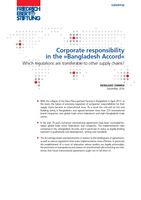 This study from the Friedrich Ebert Foundation was published in December 2016. The Bangladesh factory collapse in April 2013 with its 1,100 death toll had provoked a world-wide debate on the responsibility of textile companies in the supply chain (see
This study from the Friedrich Ebert Foundation was published in December 2016. The Bangladesh factory collapse in April 2013 with its 1,100 death toll had provoked a world-wide debate on the responsibility of textile companies in the supply chain (see 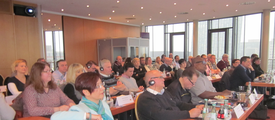 The annual conference of the EWC Academy was held on 30 and 31 January 2017 in Hamburg for the ninth year in a row. The focus was on current developments in the EWC and SE landscape as well as on the Brexit. The demands for the forthcoming revision of the EWC Directive were discussed on the basis of several studies, presented by Romuald Jagodziñski, researcher at the European Trade Union Institute (ETUI) in Brussels. On the second day there were two seminars: employee representation in the United Kingdom and EU legislation.
The annual conference of the EWC Academy was held on 30 and 31 January 2017 in Hamburg for the ninth year in a row. The focus was on current developments in the EWC and SE landscape as well as on the Brexit. The demands for the forthcoming revision of the EWC Directive were discussed on the basis of several studies, presented by Romuald Jagodziñski, researcher at the European Trade Union Institute (ETUI) in Brussels. On the second day there were two seminars: employee representation in the United Kingdom and EU legislation. The board of the BCD Group's European works council met on 1 and 2 February 2017 in Hamburg and received training from the EWC Academy on how to improve their consultation procedures. This Dutch company is one of the world's largest service providers for business travel management. The European works council was established in 2008, after BCD had acquired the business travel division of the German TUI group. Today, Germany represents one of the most important countries within the BCD Group. Although the EWC agreement has not changed since 2008, the standards of the new EU Directive can be fully applied to the consultation procedure, as with all Article-6 agreements.
The board of the BCD Group's European works council met on 1 and 2 February 2017 in Hamburg and received training from the EWC Academy on how to improve their consultation procedures. This Dutch company is one of the world's largest service providers for business travel management. The European works council was established in 2008, after BCD had acquired the business travel division of the German TUI group. Today, Germany represents one of the most important countries within the BCD Group. Although the EWC agreement has not changed since 2008, the standards of the new EU Directive can be fully applied to the consultation procedure, as with all Article-6 agreements. The steering committee members of both ZF and TRW Automotive came together for a meeting in Friedrichshafen on 22 and 23 February 2017. With the assistance of EWC Academy, they discussed the structure of a combined EWC. Germany's third largest automobile supplier ZF had bought the US company TRW in 2015 (see
The steering committee members of both ZF and TRW Automotive came together for a meeting in Friedrichshafen on 22 and 23 February 2017. With the assistance of EWC Academy, they discussed the structure of a combined EWC. Germany's third largest automobile supplier ZF had bought the US company TRW in 2015 (see  Our annual seminar will be held from 18 to 21 April 2017 in Montabaur (High-speed-railway station half way between Frankfurt and Cologne). The following topics are being offered in parallel:
Our annual seminar will be held from 18 to 21 April 2017 in Montabaur (High-speed-railway station half way between Frankfurt and Cologne). The following topics are being offered in parallel: Seminar on new EU General Data Protection Regulation
Seminar on new EU General Data Protection Regulation The fifth conference on industrial relations in the USA is being held from 18 to 20 September 2017 in Berlin. Apart from a review of historical developments, a special focus will be put on the current situation following the presidential elections. The seminar is addressed to works council members from US companies as well as from European companies with large sites in the USA. The speakers include Hermann Nehls, currently labour, health and social affairs counselor at the German Embassy in the USA, and Thomas Greven, lecturer at John F. Kennedy Institute for North American studies at the Free University Berlin and former staff member in the office of Bernie Sanders.
The fifth conference on industrial relations in the USA is being held from 18 to 20 September 2017 in Berlin. Apart from a review of historical developments, a special focus will be put on the current situation following the presidential elections. The seminar is addressed to works council members from US companies as well as from European companies with large sites in the USA. The speakers include Hermann Nehls, currently labour, health and social affairs counselor at the German Embassy in the USA, and Thomas Greven, lecturer at John F. Kennedy Institute for North American studies at the Free University Berlin and former staff member in the office of Bernie Sanders. A seminar on Chinese labour relations as well as intercultural aspects is being organized from 11 to 13 October 2017, in Munich. It is addressed to works council members who are involved with investors from China or who have subsidiaries there. The seminar includes a visit to Krauss Maffei. This machine manufacturing group was acquired by a Chinese company at the beginning of 2016. Their works council chairman will give a report on his experience.
A seminar on Chinese labour relations as well as intercultural aspects is being organized from 11 to 13 October 2017, in Munich. It is addressed to works council members who are involved with investors from China or who have subsidiaries there. The seminar includes a visit to Krauss Maffei. This machine manufacturing group was acquired by a Chinese company at the beginning of 2016. Their works council chairman will give a report on his experience. A seminar is being held from 18 to 20 October 2017 in Gdańsk. It is addressed to works council members who are confronted with the relocation of business units (Shared service centers) to Central and Eastern Europe. It will provide the possibility to exchange experience on how to handle such relocations. Labour relations in Poland and the role of Polish members in the EWC will also be covered.
A seminar is being held from 18 to 20 October 2017 in Gdańsk. It is addressed to works council members who are confronted with the relocation of business units (Shared service centers) to Central and Eastern Europe. It will provide the possibility to exchange experience on how to handle such relocations. Labour relations in Poland and the role of Polish members in the EWC will also be covered.